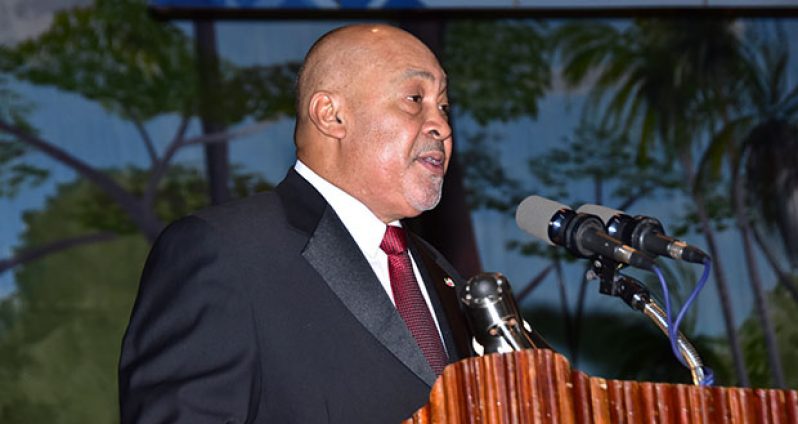By Svetlana Marshall
PRESIDENT of the Republic of Suriname, Desiré Bouterse championed the cause for the further diversification of the region’s economy when he addressed the 37th Regular Meeting of Conference of the Heads of Government of the Caribbean Community (CARICOM) on Monday.The ever depleting commodity prices on the world market is undoubtedly having a domino-effect on member states, particularly those that are heavily dependent on the extractive sector, the Surinamese President said, as he addressed the gathering at the National Cultural Centre, Georgetown.

“We must move into diversification of our economies… we have to develop our services industries to the point where they become solid foreign currency earners characterised by sustainability,” President Bouterse said.
In their quest to diversify their economies, member states, particularly those dependent on the extractive sectors, must come together to brainstorm solutions to the challenges they face.
Countries mono dependency on the tourism industry is also proving to be very problematic, the Surinamese President added.
“Because of the decline on the world’s economy, we have noticed a decline in the number of tourists travelling to our region,” he said, while lobbying CARICOM Secretary General, Irwin LaRocque to establish a connection with the Association of Caribbean States (ACS) Secretariat to nominate experts who will advise member states on creative ways to establish new tourism packages more visitors to the region.
Though the Caribbean Community continues to face many challenges, Prime Minister of Trinidad and Tobago, Dr Keith Rowley said the achievements made should not and cannot be understated.
As he delivered his inaugural address at the high-level regional meeting, the Trinidadian Prime Minister said member states have made significant progress either as a group or individually.
“In our early history, we, the Caribbean, the Caribbean Community, would have united against the apartheid in South African. We were resolute in our position on the economic embargo against Cuba. As a region, were able to negotiate, to our citizens’ benefit, successful trade agreements. United, we brought the issue of Chronic Non-communicable Diseases to the international stage,” Prime Minister Rowley said.
While CARICOM has made some significant strides through functional cooperation in several critical areas, he said, undoubtedly, it has and continues to face equal challenges.
NOT ABOUT POPULARITY
Nevertheless, in moving forward, he said, tough decisions must be made. “Leadership is not always about popularity; leadership sometimes is about leading and making tough decision,” he posited.
On that note, the Trinidad Prime Minister called for CARICOM to put the Caricom Single Market and Economy (CSME) back on the active agenda.
CSME was designed to facilitate the full use of labour, exploitation of other factors of production, competitive production leading to greater variety; quality and quantity of goods and services, thereby providing greater capacity to trade with other countries.

The CSME was signed into effect in 2001, however, its implementation had proven to be challenging. After several years of delay, the CARICOM Heads of Government in 2011 declared that progress towards the Single Economy had been put on pause as a consequence of the 2007-2008 financial crises.
In Trinidad, he said cognisance was taken of the need to give special priority to CARICOM; hence, a policy framework is being put in place to enhance his country’s relations with CARICOM, starting with the renaming of the Ministry of Foreign Affairs to the Ministry of Foreign and CARICOM affairs.
He said too, his Cabinet has also taken a decision to reopen a High Commission in Barbados, which when operational, together with the Mission in Jamaica, will ensure that Trinidad and Tobago has bilateral accreditation in all CARICOM countries.
CRIME AND SECURITY
Attention, he said, must also be given to the area of crime and security which continues to be a sore area of concern.
“As leader for crime and security in CARICOM, I wish to give you the assurance that under my stewardship, the Government of Trinidad and Tobago intends to take an active role in other matters pertaining to regional security. The sustainable development of our community depends on us….Too much of our economy, too much of our well-being, too much of our progress and our quality of life depend on security for us to not be focus on the peace and comfort of our people.”
St Lucia Prime Minister, Allen Chastanet, in his address, said the people of the region must feel the tangible benefits that regional integration brings with it.
“The recent referendum that voted for Britain to exit the European Union has put the survival of integration into focus. People are once again asking, what is in it for me and my country? What if our people ask for such a referendum? Are we certain of their response? Have we done enough to create a connection between our people and this community?”
Prime Minister Chastanet said the CARICOM has an excellent pool of human resources that should be utilised for the effective materialisation of the community’s objectives at a time when small member states are experiencing growing challenges.
“These global challenges are now beating down at the door of the survival of small islands and developing nation states. They all want their fair pound of flesh for the bare bones of our humanity,” he said.
Prime Minister Chastanet stressed that steps must be taken to reduce cost and increase efficiency in governance across CARICOM.
He also championed the cause for the equality of women, saying that though they contribute significantly to the development of the region, they are still being undermined.



.jpg)








